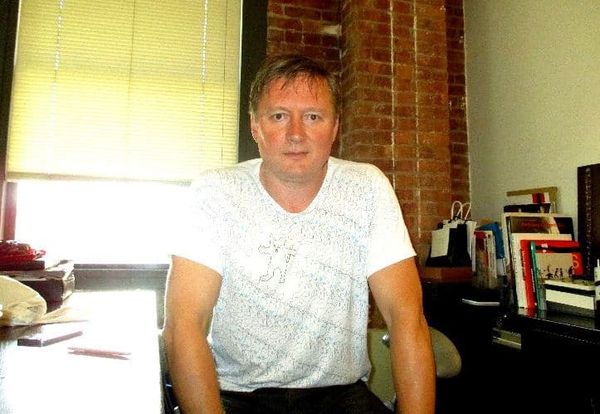David Mackenzie's humane look at the tortured prison system in Tribeca Film's Starred Up stars Jack O'Connell, Ben Mendelsohn and Rupert Friend with a screenplay by prison system therapist Jonathan Asser. In New York, the morning before the opening of his film, the director and I discussed the spell of John Boorman's Point Blank, which stars Lee Marvin, making Perfect Sense, Patrick McGrath's Asylum, and Charles Laughton's The Night Of The Hunter with Robert Mitchum's knuckles exploring the meaning of love and hate.
Even before we see, we hear the prison. Sounds foreboding and leaden, metal gates slamming shut, steps with the weight of heavy hearts. The spirit of place is one of terror. Mackenzie filmed in a former prison in Ireland, no soundstage set could accomplish so much dread in a repository. We, the spectators, get no sense of an outside world that lies beyond. We are with the prisoners, the guards, the officials, inside these walls.
 |
| Jack O'Connell as Eric Love in Starred Up. "I always wanted to be able to start a movie on a face where you know very little and start to build up information based on action." |
Jack O'Connell plays Eric Love, a juvenile delinquent who is "starred up", which means that he is so violent that he is upgraded two years early to an adult prison at age 19. This is where he meets his father, Neville Love (Ben Mendelsohn in a sensational balancing act between good and evil, lost and found) who is in for life.
Language at times can become pure rhythm, a Finnegan's Wake of violence and impossible longing for belonging swallowed by the bright yellow walls. The prison colors are yellow and green, the inmates dressed in sweatshirts and sweatpants in the colors of the sky. "Get up, son" and "sorry, love," transcend the everyday in bright, confidently placed splinters of symbolism. A teacup spells hate in German or is it just the abbreviation of the owner's name? Baby oil as a slick weapon or the memory of a smell? A therapist, Oliver (Rupert Friend) works with a group of prisoners and tries to help Eric to think twice before acting. Fighting is everything.
Mackenzie's film can be read as a plea for prison reform, which would be worthy on its own. It is more. Eric has a huge cross tattooed on the side of his upper body rib cage to hip. He is redeemer, trickster, catalyst and we learn the mechanics of the cutthroat world with him. Father and son compete against the tide. Mothers are the void the prisoners dance around.
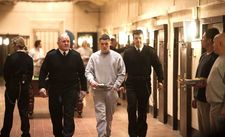 |
| Jack O'Connell as Eric Love imprisoned. "It was very clear to me that I wanted the film to exist entirely within the world of that prison." |
"You are far too involved," is the most self-serving comment the prison therapist gets - it marks the beginning of the end. Change is our only hope.
Anne-Katrin Titze: I'd like to start with the very beginning of Starred Up. Sounds before image. We don't know exactly what we hear - gates and metal. Was it always clear to you that you would prepare us this way?
David Mackenzie: It was very clear to me that I wanted the film to exist entirely within the world of that prison. So therefore the entrance into it was the way in. I wanted to put that from the perspective of him [Eric, played by Jack O'Connell]. He is stuck in a box and obviously we cut to him. The sounds that he would be hearing as he is going in there, not knowing because he can't see out of the window. And to put us into this abstract kind of slamming and beeping.
AKT: First day of school in hell or something like that.
DM: It's a really interesting thing that you are picking up that. Also something kind of quiet to start off with. To have you lean in and listen.
AKT: It sets the tone of the place. The spirit of place is something that a set built in a studio could never ever provide.
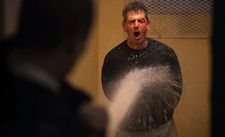 |
| Ben Mendelsohn as Neville Love in Starred Up: "Ben is one of the most interesting actors I ever worked with partly because he is so mercurial." |
DM: It was pretty much the first decision I made when I read the script which had a very strong authentic voice, very powerful character and sense of anger. At the heart of it was this authentic thing and I thought there's only one way of doing this and that is to find a location which is the real location and not to cheat anything. To keep the purity of the space as 100% as possible.
AKT: I just recently watched John Boorman's Point Blank again.
DM: Ah, yes. One of my very favorite films.
AKT: The sense of Alcatraz - he also used the real location. Your prison could be anywhere. We never get a sense of the outside.
DM: There is no establishing shot. At the end of Point Blank there's a game where he zooms out of Alcatraz but he is actually in there.
AKT: One of Eric's first actions when he enters is the making of this unique weapon out of a toothbrush. We initially enter with him and at the moment he builds the weapon you create distance. The audience realises that he is well prepared or that he is preparing himself for this new world of adult prison. The sense of disconnect with most audiences is very strong.
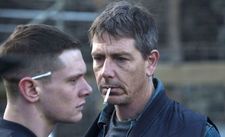 |
| Father (Neville) and son (Eric) Love: "Jonathan very specifically wrote the characters of Eric and Neville Love. hat was the name he chose for them because…" |
DM: The idea of him doing something that you don't quite understand what it is and you're gradually accumulating an understanding of it. It's interesting, I did the soundtrack album and put titles to the pieces of music we composed. This track was called 'Preparing for War'. That's sort of what he is doing. I think the idea of an action that is obscure is a fantastic way into a character.
I always wanted to be able to start a movie on a face where you know very little and start to build up information based on action. I don't think I've ever done it. This is an interesting first experience doing that, getting into that person. You don't know why but you understand that he needs it.
AKT: It is a total necessity for survival, as it turns out. In the midst of all the real, you have some free floating symbolism. Charles Laughton's The Night Of The Hunter came to mind. Your protagonists have the last name Love and another character has the German word for hate, Hass, written on his mug as an abbreviation of his name.
DM: Ha ha. He is Hassan. Totally unintentional but brilliant piece of text symbolism. Great. I'd be very happy to claim that but it wouldn't be true.
AKT: Eric also has the cross tattoo on his body.
DM: Jonathan [Asser] very specifically wrote the characters of Eric and Neville Love. That was the name he chose for them because he thought these were people who are called by this name but have no understanding of its meaning. Part of the film is about them beginning to understand.
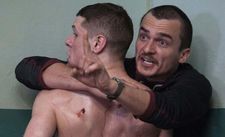 |
| Rupert Friend as prison therapist Oliver protecting Eric Love. "…it's a very interdependent world." |
AKT: You show the most wonderful hug without using arms in film history, as far as I am aware.
DM: I didn't know there was the sub-category of "armless hug".
AKT: You got it.
DM: The armless hug prize.
AKT: The actors are fantastic. Ben Mendelsohn is always good and you got a very multi-faceted performance from him. Were you surprised by some of what he did?
DM: Ben is a constant surprise. Ben is one of the most interesting actors I ever worked with partly because he is so mercurial. He has a combination of complete control of stagecraft and understanding of where the camera is and what needs to be done and the magic uncontrollability of the moment. So you have someone you can aim in exactly the right direction and also who is going to surprise you. He is a fantastic combination.
AKT: Couldn't you say the same thing about your film? Isn't it a similar mixture of control and freedom?
DM: That's kind. Control and freedom was kind of how we tried to make the film work. One of the things most thrilling to me was that I was very much in control of the process. We're in a jail, a confined place. Within that at the heart of it was quite a lot of freedom.
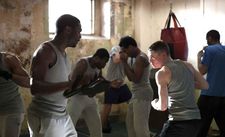 |
| Starred Up prison exercise: "...if you let your guard down, you are in trouble. Everyone is building masks." |
All the actors were allowed to explore. They weren't being funneled. There was a creative heart. It was a very thrilling process and I was very happy to be daddy of this team. They were able to explore knowing that they were surrounded by these fixed things but had room to move.
AKT: There is a moment of jealousy between father and son where I thought - this is the male prison equivalent to Snow White. The father says "so you think you are better than me?" It is questioning the mirror, the vanity.
DM: That's an interesting theme. In that world, you don't think there'd be vanity. But there's an awful lot of vanity. And the sense that if you let your guard down, you are in trouble. Everyone is building masks.
AKT: The mother is very present as absence in this world. There is the image of the mother on the wall, another prisoner's phone call to the mother. The rule "we don't talk about mothers" in the group therapy sessions.
DM: Yes. The obsession with protecting the mother in some strange way. And that being a cause to fight. The cause to make you stand your ground.
AKT: You could link that to what you said earlier about the preparation for war. Defense of the mother as shield. Let's talk about the colors, we mentioned Boorman, who worked a lot with that. Yellow and green are the colors of your prison, which is an unusual choice.
DM: it's interesting that prisons are usually portrayed as steel and blue. In the existing jail, some of the doors were yellow and green and we didn't even have to work very hard for that. The decision to make the cells warm and the look of the film a bit more warm was something that we decided quite early on. A prison is actually quite cinematic.
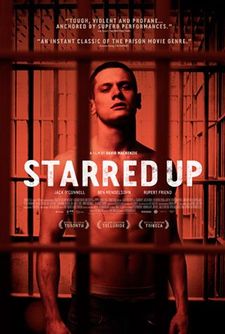 |
| Starred Up US poster |
You have a very limited palette, incredibly limited. But within each of those areas, the corridors, the bars, the windows, the doors, the frames, the ups and downs - it's quite cinematic within these limitations. When I first went to jail, I went mad with my camera and took thousands of photographs - there was such variety.
AKT: There are moments of disbelief that reminded me of what you did in Perfect Sense. These are true to real life instances when you don't believe that what is happening is really happening. The towers burning on 9/11, for example. Is it your intention to take a look at these moments of suspended understanding?
DM: There is a calm. You don't want to believe it. So you hold yourself back. A part of the reason why I made this film was almost in reaction to Perfect Sense because Perfect Sense was a film dealing with enormous things on a very large scale in a very minimalist way and also in a more metaphorical way. I wanted to strip the metaphor back. It was a conscious attempt to minimise that and work with a straighter, and smaller and more contained palette.
AKT: With many movies out there, you can ask yourself why would anyone spend all this energy and time and money to make this. Starred Up clearly makes the audience think about prison reform - that is not frivolous.
DM: I don't think there is a one line reform message there. You are trying to show the audience into a world, make the audience understand a world and then maybe they ask themselves.
AKT: The theme of therapy and institutions you already had in Asylum based on Patrick McGrath's novel. He himself grew up in an asylum his father was the head of.
DM: Asylum and this film have things in common in many ways. It's a different kind of movie but certainly the institution itself is obviously a huge part of it.
AKT: And how everyone in this institution has a shared experience. The guards as well.
DM: They are just as imprisoned. I mean, they get to go home at the end of the day but it's a very interdependent world. A lot of what Jonathan talks about in terms of how the whole criminal justice system becomes interdependent and perpetuates itself, there is definitely an echo in both of those movies.
AKT: Is it baby oil Eric uses in a scene? There is the reality mixing with the symbolism - conjuring up the baby, the mother.
DM: The weird thing is, they are actually allowed baby oil in jail. All of the things in the cell they would be allowed.
AKT: I must admit that I didn't always understand the language. I also felt it didn't matter in a Finnegan's Wake kind of way.
DM: You are being very kind. The language was one of the hardest questions. The first draft came with even more prison slang, more words that were hard to understand. It was very much part of the flavour. Over the course of making it we were encouraged to be a bit more clear to the audience. We really juggled clarity with the strength of this lexicon.
It has been a discussion whether the film should have subtitles and what the subtitles are. A slang word is still a slang word. But I think we got the right balance and I'm very pleased that the film has a lot of this language in it. It is the real language of a London jail. People in jail would recognise the words. It's part of the strength and the authenticity.
Starred Up opens at the Film Society of Lincoln Center on August 27 with David Mackenzie doing Q&A's following the 7:00pm screenings on the 27th and 28th. It is available on DVD in the UK.








